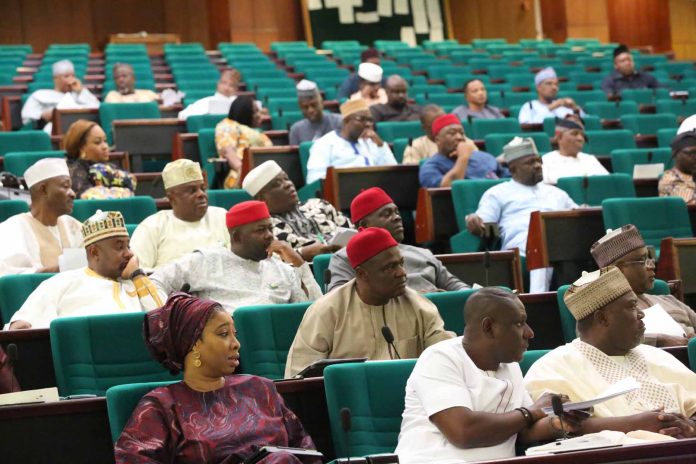In order to go from the current presidential style of administration to the parliamentary system, some 60 members of the House of Representatives are now attempting to modify the 1999 Constitution.
Leading the charge for a return to the parliamentary system was Wale Raji, an All Progressives Congress legislator representing Lagos State. Among other reasons, the MPs cited the need to lower government expenses and have vigorous policy discussions.
The measure, titled “The Bills proposing constitutional alterations for a transition to parliamentary system of government,” was introduced on the House floor on Wednesday during plenary session. It was sponsored by House Minority Leader Kingsley Chinda along with 59 other members in Abuja.
The lawmakers – drawn from different party affiliations, anchored their positions on the need to adopt a parliamentary system at the Federal, State and Local Government levels.
Addressing a press conference at the National Assembly Complex on Wednesday, the spokesman for the sponsors and member representing Kebbe/Tambuwal Constituency, Sokoto State, Abdulssamad Dasuki said that when passed, it would significantly impact the national political landscape.
He said, “Our founders in their wisdom and in a political atmosphere devoid of compulsion, and having considered the interests of their native peoples and their desire to live together in a country where truth and justice reign, where no man is oppressed, and where all citizens live in peace and plenty, adopted the parliamentary system of government.
That was the governance system of the First Republic, a period when legislative and executive powers were exercised by the representatives of the people in parliament and in the executive, and by the nature of the system, these representatives were accountable to the people.
For six years while it was in operation, the system worked for the country.”
He added, “The collapse of the First Republic and the long stretch of military rule culminated in the adoption of a new system of government, theoretically fashioned after the presidential system of the United States but in practice, imbibed the uttermost attributes of military rule.
No wonder the Nigerian President appears to be one of the most powerful presidents in the world.
Over the years, the imperfections of the presidential system of government have become glaring to all, despite several alterations to the constitution to address the shortcomings of a system that has denied the nation the opportunity of attaining its full potential.
Among these imperfections are the high cost of governance, leaving fewer resources for crucial areas like infrastructure, education, and healthcare, and consequently hindering the nation’s development progress, and the excessive powers vested in the members of executive, who are appointees and not directly accountable to the people.
The bills presented today (Wednesday) seek a return to the system of government adopted by our founders, which made governance accountable, responsible and responsive, and ultimately less expensive.”
Following the presentation of the bills, the lawmakers said they intend to “ignite, provoke a national conversation about the future of the Nigerian governance system, ensure robust public debates, stakeholder consultations, expert analyses, and a thorough and informed decision-making process and raise awareness about this significant development and encourage constructive dialogue on the potential implications of these proposed constitutional alterations.”
While noting that the future of Nigeria’s governance rests on informed public engagement and responsive and responsible leadership, the sponsors of the bill noted that under the parliamentary system, the President will be replaced with a Prime Minister to serve as the Head of Government and establishing the office of the President as a ceremonial leader, stressing that “these elective offices are to be chosen from the elected members of the legislature.”
Legislative elections
Dasuki added that under legislative election, there would be a shift “in the process of electing governors and Chairmen of Local Governments from general election to voting within their respective legislative bodies.”
Streamlined administration
The parliamentary system, according to Dasuki, will potentially reduce “bureaucratic hurdles and foster closer collaboration between the executive and legislative branches.
“Our conviction is that a streamlined executive branch, which replaces the President and Vice President with a Prime Minister and Cabinet chosen from the legislature, could lead to a smaller central government, reducing salaries and administrative expenses.
We also hold strongly that shifting the election of Governors and Local Government Chairmen from general election to votes within their respective legislative bodies could save billions spent on state and nationwide campaigns.
Because ministers, commissioners (at the state level) and supervisors (at the local government level) emerge from parliament, there is greater coordination between the executive and the legislature, just as there will be increased legislative scrutiny, which would make cabinet members responsive to the yearnings of the people and more accountable.”
Conclusively, the lawmakers said as proponents of the constitutional alteration, they place national interest above any other consideration.
“Our hope is that the national conversation that would be ignited by these bills would lead to a system of government that works and our dear nation would attain her full potential,” they stated.
Leader of the sponsors of the bill and the lawmaker representing Epe Federal Constituency, Lagos State, Wale Raji, said though the road to the actualisation of the bid is a fairly long one, he noted that they hope to achieve their dream at a date not later than 2031.






